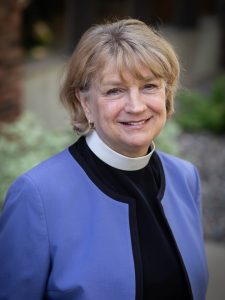 By Bishop Ann Svennungsen
By Bishop Ann Svennungsen
I have never attended a “Blue Christmas” worship service. Perhaps, this year.
The service, often held on the longest night of the year, is a time to gather with others, to name the losses that make this season difficult, to lament and pray, and to experience the promise and presence of God.
“The ancient wisdom of the Psalms speaks to us in our journey with the ‘universal and inescapable’ experience of grief.”
As we prepare to decorate our trees and homes during Advent, it’s hard not to experience the pain of loss in our lives:
- Setting up my mom’s white porcelain nativity set, wishing she were near
- Eating lefse and remembering the fun Dad and I had (and the incredible mess we made) trying to make this strange Norwegian treat.
- Wondering what it would be like if our son could have lived to celebrate his 36th Christmas with his nephew and niece – now so grown up – and his nephew Noah, whom he never met.
DEATH IS NOT THE only loss we grieve during this season. The authors of All Our Losses All our Griefs write “experiences that evoke grief are both more frequent and more varied than most people imagine. … Grief is universal and inescapable. … It is the composite of powerful emotions assailing us whenever we lose someone or something we value. Grieving is the intentional work grief-stricken persons engage in, enabling them to return eventually to full, satisfying lives. It can be avoided, but at a very high cost to the one who refuses it.”
“Death is not the only loss we grieve during this season.”
The ancient wisdom of the Psalms speaks to us in our journey with the “universal and inescapable” experience of grief. One liturgy for a Blue Christmas service begins with Psalm 22: (endnote 2)
My God, my God, why have you forsaken me?
Why are you so far from helping me, so far from the words of my groaning?
O my God, I cry by day but you do not answer,
and by night, but I find no rest.
In you, our ancestors trusted. They trusted and you delivered them.
It was you who brought me from the womb,
you who kept me safe on my mother’s breast.
Since my mother bore me, you have been my God.
Do not be far from me, for trouble is near and there is no one to help.
God does not despise the affliction of the afflicted.
God does not hide from me.
When I cry to God, God hears me.
Thanks be to God.
This Psalm, also prayed by Jesus from the cross, connects us with our God who suffers with us and for us; our God who holds us in all our losses; and our God whose resurrection promise embraces us and our loved ones for all eternity.
Maybe this is the year for me to attend such a service. Perhaps you will, too.
And may God grant us all wisdom and compassion to be truly present with others. If the experience of loss is universal, it is likely we will encounter someone grieving in the days ahead. May we be lovingly attentive – not to fix or advise – but simply to love, as a small sing of the incarnate love of God.
And, Advent blessings to you all. (Should your community host a Blue Christmas service, I invite you to post an invite on our Facebook page. You can also register to participate in a virtual service.
